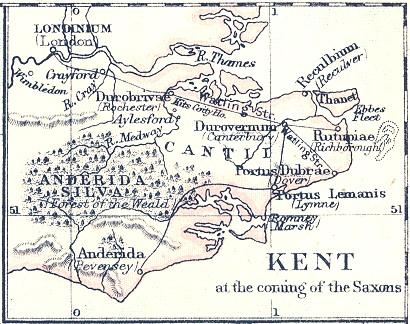< Vt veniēns Brittānian Augustīnus prīmō in īnsulā Tanātō rēgī Cantuāriōrum praedicārit, et sīc acceptā ab eō licentiā Cantiam praedicātūrus intrāverit.>
[1] Rōborātus ergō cōnfirmātiōne beātī patris Gregōriī, Augustīnus cum famulīs Chrīstī, quī erant cum eō, rediit in opus verbī pervēnitque Brittaniam. [2] Erat eō tempore rex Aedilberct in Cantiā potentissimus, quī ad cōnfīnium usque Humbrae flūminis maximī, quō merīdiānī et septentriōnālēs Anglōrum populī dirimuntur, fīnēs imperiī tetenderat. [3] Est autem ad orientālem Cantiae plāgam Tanatos īnsula nōn modica, id est magnitūdinis iuxtā cōnsuētūdinem aestimātiōnis Anglōrum familiārum sexcentārum, quam ā continentī terrā sēcernit fluvius Vantsumu, quī est lātitūdinis circiter trium stadiōrum, et duōbus tantum in locīs est trānsmeābilis; utrumque enim caput prōtendit in mare. [4] In hāc ergō applicuit servus Dominī Augustīnus, et sociī eius, virī, ut ferunt, fermē XL. [5] Accēpērant autem, praecipiente beātō pāpā Gregōriō, dē gente Francōrum interpretēs; et mittēns ad Aedilberctum mandāvit sē vēnisse dē Romā ac nūntium ferre optimum, quī sibi obtemperantibus aeterna in caelīs gaudia et rēgnum sine fīne cum Deō vīvō et vērō futūrum sine ūllā dubietāte prōmitteret. [6] Quī, haec audiēns, manēre illōs in eā quam adierant īnsulā, et eīs necessāria ministrārī, dōnec vidēret quid eīs faceret, iussit. [7] Nam et anteā fāma ad eum Chrīstiānae religiōnis pervēnerat, utpote quī et uxōrem habēbat Chrīstiānam dē gente Francōrum regiā, vocābulō Bercta, quam eā condiciōne ā parentibus accēperat, ut rītum fideī ac religiōnis suae cum episcopō, quem eī adiūtōrem fideī dederant, nōmine Liudhardo, inviolātum servāre licentiam habēret.
[8] Post diēs ergō vēnit ad īnsulam rēx, et residēns sub dīvō iussit Augustīnum cum sociīs ad suum ibīdem advenīre colloquium. [9] Cāverat enim nē in aliquam domum ad sē introīrent, vetere ūsus auguriō, nē superventū suō, sīquid malificae artis habuissent, eum superandō dēciperent. [10] At illī nōn daemonicā sed dīvīnā virtūte praeditī veniēbant, crucem prō vēxillō ferentēs argenteam, et imāginem Dominī Saluātōris in tabulā dēpictam, laetāniāsque canentēs prō suā simul et eōrum, propter quōs et ad quōs vēnerant, salūte aeternā Dominō supplicābant. [11] Cumque ad iussiōnem rēgis residentēs verbum eī vītae ūnā cum omnibus quī aderant eius comitibus praedicārent, respondit ille dīcēns: ‘Pulchra sunt quidem verba et prōmissa quae adfertis; sed quia nova sunt et incerta, nōn hīs possum adsēnsum tribuere, relictīs eīs quae tantō tempore cum omnī Anglōrum gente servāvī. [12] Vērum quia dē longē hūc peregrīnī vēnistis et, ut ego mihi videor perspexisse, ea, quae vōs vēra et optima crēdēbātis, nōbīs quoque commūnicāre dēsīderāstis, nōlumus molestī esse vōbīs; quīn potius benignō vōs hospitiō recipere et, quae victuī sunt vestrō necessāria, ministrāre cūrāmus, nec prohibēmus quīn omnēs quōs potestis fideī vestrae religiōnis praedicandō sociētis.’ [13] Dedit ergō eīs mānsiōnem in cīvitāte Doruvernēnsī, quae imperiī suī tōtīus erat mētropolis, eīsque, ut prōmīserat, cum administrātiōne victūs temporālis licentiam quoque praedicandī nōn abstulit. [14] Fertur autem quia adpropinquantēs cīvitātī mōre suō cum cruce sānctā et imāgine magnī rēgis Dominī nostrī Iesu Chrīstī hanc laētāniam cōnsonā vōce modulārentur: ‘Dēprecāmur tē, Domine, in omnī misericordiā tuā, ut auferātur furor tuus et īra tua ā cīvitāte istā, et dē domō sānctā tuā, quoniam peccāvimus. Allēlūia.’

